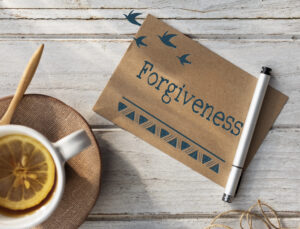
Forgiveness is the conscious decision to release feelings of resentment or vengeance against someone who has harmed or offended you, regardless of whether they deserve your forgiveness. It represents a deliberate choice to let go of negative emotions such as anger, hatred, or blame, and to respond with understanding and compassion instead.
At its core, forgiveness is about letting go. When we forgive, we make a commitment to stop holding on to pain, bitterness, and the desire for retribution. We make peace with what occurred and acknowledge that the past cannot be changed. Forgiveness allows us to free ourselves from being consumed by hurt, and prevents destructive emotions like embarrassment, shame, bitterness, and resentment from taking root and keeping us from moving forward.
Forgiveness does not mean excusing, justifying, condoning, or forgetting the offense. We can forgive someone without approving of their actions or reconciling the relationship. Forgiveness is fundamentally for our own healing and peace of mind. It’s a gift that we not only give to a person who harmed us but also a gift we give ourself.
We forgive by consciously letting go of resentment and negative judgments, and replacing them with understanding, empathy, and compassion both for others and ourselves. This allows us to regain authority over our mind, will, emotions, and situations we chose to be in. Forgiveness gives us the power to not be defined by the pain of the past.
Forgiveness is a choice
Forgiveness is a choice and it takes courage and inner strength. It is an internal decision we make, not something that depends on the actions of the person who hurt us. When we’ve been wronged, it’s natural to feel resentment, bitterness, or the desire for revenge. However, holding on to these negative emotions only breeds more negativity.
Choosing forgiveness means letting go of anger and the need for retribution. It doesn’t mean excusing, justifying, or forgetting the offense. Forgiveness simply means releasing the pain and toxicity of the past, and resolving to move forward in peace. This allows us to heal.
No one can force us to forgive if we aren’t ready. However, it’s important to understand that forgiveness benefits us, not the person who hurt us. When we choose not to forgive, we are the one who suffers. Holding a grudge keeps us trapped in the original pain, like pouring salt in an open wound over and over. Forgiveness allows the wound to finally heal.
Forgiving is not a sign of weakness but of strength. It takes great courage and resilience to let go of unforgiveness that feels justified. But being able to forgive allows us to reclaim our personal power and it opens the door for understanding, empathy, and peace. Forgiveness is a choice that takes us from suffering to freedom.
It is very important to understand that forgiveness is not forgetting. Forgiving someone does not mean you forget or condone their actions. You can forgive someone without trusting them again. Forgiveness does not require letting toxic people back into your life or pretending the harm never happened.
Forgiveness is about releasing the anger and pain from your end, not absolving the other person or the actions that were done. You can forgive someone and still maintain healthy boundaries or distance yourself from them.
While forgiveness involves releasing anger, it does not require forgetting harm that was done or naively trusting again. You can forgive and still protect yourself by setting boundaries and limiting interactions with someone who has harmed you. Forgiveness is not about them, but for you to heal and live with more peace and compassion.
Signs You Need to Forgive
Forgiveness is not always easy, and sometimes we may not be aware that forgiveness is what is needed. Here a few signs that may indicate you need to consider forgiveness:
Holding on to Resentment. If you find yourself frequently thinking about a past hurt and replaying it in your mind, you are likely holding on to resentment. This resentment can fester and prevent you from moving forward. When resentment goes unchecked or attended to it leads to anger, bitterness, and persistent irritation. When resentment settles in the heart it prevents you from experiencing joy and peace.
Inability to Move Forward. When you are unable to move past a grievance, it can negatively impact your mental health and relationships. If you are constantly troubled by memories of the past wrongdoing, and you are not able to fully engage in the present, you may be stuck in unforgiveness. Forgiveness can help release you from the things of the past in order for you to be present and move forward healthy into the future.
Damaged Relationships. Inability to trust, allow reconciliation, or space for new relationships. If you notice relationship problems stemming from a lack of forgiveness, it may be time to reflect on letting go. Forgiveness has the power to heal and restore relationships.
Forgiving Yourself
Forgiving yourself can be one of the most difficult parts of the forgiveness journey. Many of us are far kinder and more understanding with others than we are with ourselves. We hold ourselves to impossibly high standards, then feel overwhelmed by guilt and shame when we inevitably fall short.
Learning self-forgiveness requires accepting that you’re human. All people make mistakes, it’s part of life. The key is to acknowledge your mistakes without judgment, learn from them, and move forward with self-compassion. Consider what you would say to a loved one who was struggling with the same feelings of regret. You’d likely reassure them of their value and worth. Offer yourself that same grace.
Forgiving yourself doesn’t mean excusing harmful behaviors. It simply means extending mercy to your imperfections. Once you’ve taken accountability, self-criticism is rarely effective. Having self-compassion and mercy is healthy and helpful.
Rather than obsessing over the past, make positive changes through better choices. Focus on living consciously and bringing more goodness into each new day. Be patient and appreciative with yourself, just as you would with anyone learning and growing. Self-forgiveness takes practice, but it allows us to shed shame, accept our humanity, and rewrite our future story.
Forgiveness is a Process
Forgiveness rarely happens all at once. It is often a journey that takes time, patience, and small steps forward. Forgiveness doesn’t mean absence of feelings and the actions that come along with forgiveness looks different for everyone. It’s important not to get discouraged when forgiveness feels out of reach. With daily effort and intention, we can slowly release the grip of negative emotions. This process allows us to move from a place of pain to a place of peace.
Forgiveness takes practice. We may need to reframe our perspective multiple times before a shift occurs. Some days we will feel more forgiving than others. The key is persistence through the ups and downs. Over time, we can get to a place of understanding, empathy, and letting go.
The journey of forgiveness is unique for everyone. There is no perfect formula. But by making the choice each day to move closer to forgiveness, we give ourselves the gift of emotional freedom. With patience and compassion for ourselves, we can get through the process.
How to Practice Forgiveness
Forgiveness is a process that takes prayer, time, self-reflection, and active effort. Here are some steps to help you practice forgiveness:
– Reflect on the hurt or offense. Think about how it made you feel and how it still affects you. Try to understand the context and reasons behind it, without justification.
– Have empathy for the other person. Consider their background, state of mind, and motivations at the time. Recognize their humanity despite their wrongdoing.
– Communicate your forgiveness. If possible and appropriate, express your forgiveness directly to the other person. This can help bring closure and relief to both parties however this is not a necessary action for forgiveness and this is not always safe or in our best interest.
– Release the negative thoughts and emotions. When memories or pain resurface, consciously let go of resentment and blame. Pray for the other person and yourself.
– When old hurts arise, counter those thoughts with affirmations of forgiveness, scriptures for healing and strength and envision what your healed self looks like. Over time this will become a new reflex.
– Accept that forgiveness is a journey. Setbacks will happen and old feelings may occasionally return. With daily practice, forgiveness becomes easier and more natural.
The key is to shift your mindset from resentment to empathy, one day at a time. By focusing on positivity and letting go of negativity around the hurt, you can heal and grow through forgiveness.
Forgiveness delivers profound spiritual, emotional, mental, relational, and physical benefits. While forgiveness is challenging, the rewards are well worth the effort. Forgiveness allows us to heal and move forward to a better future.
Journaling Prompts
- What does forgiveness mean to you?
- What stands in the way of you practicing forgiveness?
- What’s one step you can take to begin practicing forgiveness?
- Write out at least 3 scriptures, or affirmations that can help you on your forgiveness journey.

I really love this blog it really help me to think differently about forgiveness
I am excited to hear that this was helpful for you. It was good to see you last night at the Journaling Hour.